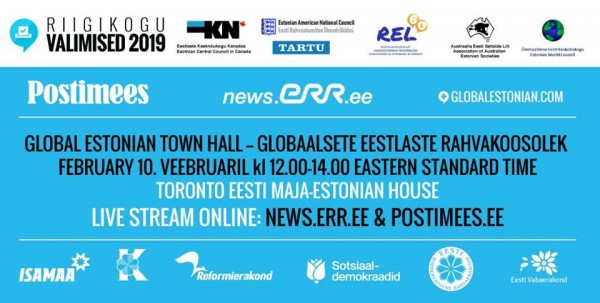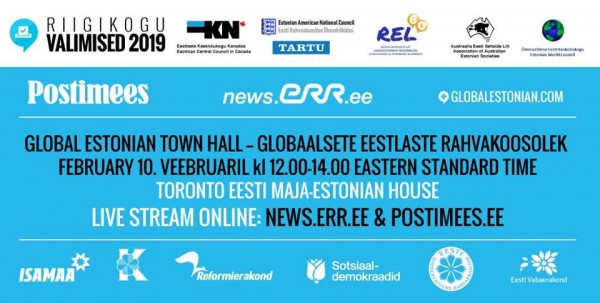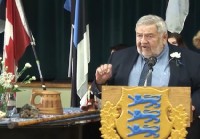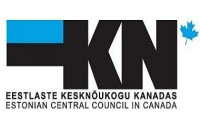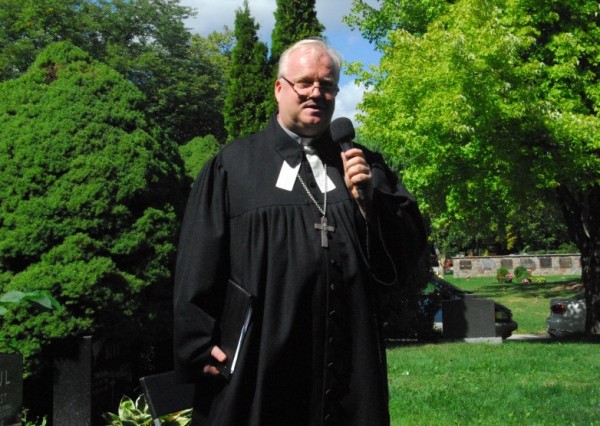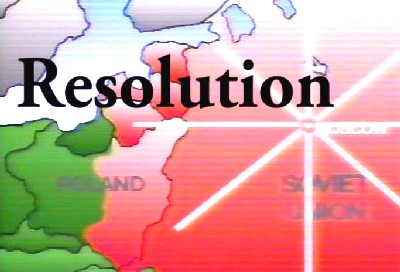
PRESS RELEASE
For immediate release
In memory of the casualties of Hitler as well as Stalin.
VE Day commemorates the fallen, celebrates victory
and should espouse truth.
Since the Russian Federation refuses to admit that its predecessor, the Soviet Union, occupied and subjugated half of Europe, the Estonian World Council urges that world leaders state this publicly.
Canadian citizens, who trace their heritage to former Soviet bloc countries, remind all who will observe the 60th anniversary of the defeat of Nazi Germany, that half of Europe was thereafter condemned to captivity.
It was also the beginning of prolonged east-west international tensions - the start of the cold war.
The Russian Federation has invited world leaders to its May 9th celebrations to mark this milestone. Pre-anniversary attempts to persuade the Russian Federation to formally condemn the Molotov-Ribbentrop Pact of 1939 have been abruptly dismissed by the Kremlin. The notorious Pact was struck between the USSR and Nazi Germany to conquer Central and Eastern Europe. It led to the invasions of Poland, Finland, Estonia, Latvia and Lithuania and the occupation and illegal annexation of the latter three.
Accusations that the Soviet Union in effect followed its “liberation” of half of Europe with the latter’s subjugation are considered heresy. Yuri Ushakov, the Russian ambassador to Washington recently stated: “Unfortunately as the anniversary nears, we see a surge in attempts to rewrite the history of WW II, to downplay the role of our country in the defeat of Nazism … and to cast doubt on the victors.”
In stark contrast, Juri Afanasjiev, a Russian historian and politician recently stated: “It is the same history of the Stalin era - forged, tendentious and ideological. Monuments are being erected to Stalin. He is being re-habilitated. …The war (WW II) against Europe started with the Soviet Union siding with Hitler’s Germany. And this is a historical fact. … Try to find this in our school texts. … We’re surprised that the Molotov-Ribbentrop pact is a fixation for the Balts. For them it’s Hamlet’s question: to be or not to be.”
It’s obvious to us that a sharper focus of the pre- and post-war events surrounding WW II are cause for guilt-ridden panic in Moscow. Vytautas Landsbergis, member of the Euro Parliament and first post-Soviet president of independent Lithuania puts it succinctly, again in reference to the Molotov-Ribbentrop pact: “When two criminals seal a contract with the blood of their victims, that act remains a crime, even if the two criminals later have a falling out and spray bullets at one another . … We must not forget the crimes that Hitler and Stalin committed together as de facto allies only because they later turned on each other.”
Are we grappling with obscure historic nuances? Categorically no. Russia’s understanding of the past drives their relations with neighboring states today. The Kremlin is frustrated and resentful that the former Soviet bloc countries reject submissiveness to Moscow, are scrambling to join NATO and the European Union, and are distancing themselves from the Moscow centered SRU.
Estonians and millions of others are convinced that their giant eastern neighbor’s feeling of statehood and national ethos are rooted in nostalgia for a lost empire. The consequent denial of the viciousness and ruthlessness of totalitarian expansion still governs the attitude that Moscow holds for its “near abroad”, its former occupied areas. It spurs the sense of distrust Russia’s neighbors have toward their former subjugator.
Russia refuses to offer a clear and unequivocal condemnation of the Moltov-Ribbentrop Pact and a sincere acknowledgement of decades of destructive policies towards its satellites and occupied countries. Thus they see the May 9th celebrations as legitimizing Moscow’s previous autocratic hegemony.
Although the comparison may offend some, the deliberate falsification of the historical record by Moscow is comparable to Holocaust denial. Just recently, the Kremlin discontinued an investigation of the murder of 15,000 Polish prisoners of war in 1940. Moscow dismisses the massacre and deportation of millions of foreign citizens as “seeing the present through a prism of the past”.
Landsbergis summarizes: “The blood of WW II victims calls for justice and fairness, but most of all it demands honesty about who caused their tragic fate. If those who gather in Moscow on May 9 do anything to validate Soviet War crimes, they will show themselves insensitive to the silent cries of WW II’s tens of millions of dead innocents. The only real winner would be the spirit of that evil.”
Lithuania, Estonia and Latvia are striving to normalize relations with the Russian Federation in order to forge a future of trust and mutually beneficial trade and investment. Truth is a powerful catalyst in healing, forgiving and reconciliation.
Estonian Central Council in Canada
(For a press conference to be held on Thursday, May 5th, 2005 at 10 a.m. in the Charles Lynch Press Room, Centre Block, Parliament Buildings, Ottawa)
ESTONIAN WORLD COUNCIL, INC. RESOLUTION
RESOLUTION regarding the soviet occupation and the illegal annexation of Estonia, Latvia and Lithuania
WHEREAS the Russian Federation is inviting world leaders to celebrate the 60th anniversary of the defeat of Nazism on May 9, 2005;
WHEREAS May 9th, 1945 is generally accepted as the beginning of the "Cold War" whereby the U.S.S.R. posed a continual, intentional and dangerous threat to the security and freedom of the peaceful democratic nations of the world;
WHEREAS the Russian Federation claims that the U.S.S.R. made the most important contribution, compared to its Allies of the time, in this victory;
WHEREAS the Russian Federation has not acknowledged the U.S.S.R.’s collusion with Nazi Germany in invading and occupying eastern and central Europe through the "Treaty of Non-aggression Between Germany and The U.S.S.R. and the Secret Additional Protocol, 23 August, 1939" (the Molotov-Ribbentrop Pact);
WHEREAS the Russian Federation, as the recognized successor to the U.S.S.R. refuses to accept culpability for subjugating and coercively controlling the nations and peoples of eastern and central Europe for nearly 50 years;
WHEREAS the Russian Federation is trivializing the Stalinist and post-Stalinist crimes against subjugated peoples which includes Russians;
WHEREAS the Russian Federation refuses to condemn those responsible and compensate victims;
WHEREAS the U.S.S.R. denied legitimate self-determination to numerous peoples and nations of eastern and central Europe for nearly 50 years;
WHEREAS the Russian Federation is deliberately equating the concept of victory with "liberation" and rejecting any notion of the U.S.S.R.'s aggression against and the occupation of Estonia, Latvia and Lithuania;
WHEREAS the Russian Federation's consistent distortion of historical truth is the primary cause of the general mistrust the peoples of eastern and central Europe have towards Russia and of the consequent tensions in the region;
WHEREAS the blatant suppression of the Mari and Chechen peoples, amongst others, continues in spite of international protest during this victory celebration;
BE IT RESOLVED that the Estonian World Council in its general annual meeting of April 9, 2005 in New York City, unanimously condemns the deliberate distortion of facts by the Russian Federation with respect to events following the surrender of Nazi Germany and urges representatives of countries participating in the May 9th victory over Nazism celebrations in Moscow to publicly express their convictions in accurately describing the historical events following the defeat of Nazism and remember it as the beginning of the "Cold War".
Estonian World Council, Inc., Association of Estonians in Great Britain, Estonian Central Committee in the Federal Republic of Germany, Estonian Central Council in Canada, Estonian American National Council Inc., Estonian National Congress in Sweden, Latvian Society of Estonian Culture, Estonian Societies in Ukraine, Estonian Society in Lithuania, Council of Estonian Societies in Russia, Estonian Club in Czech Republic, Lithuanian Community in Canada, Latvian National Federation in Canada, Baltic Federation in Canada.







